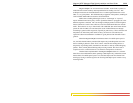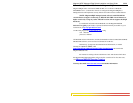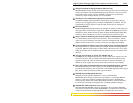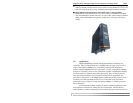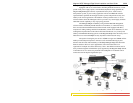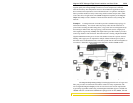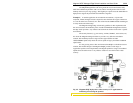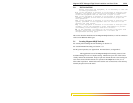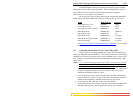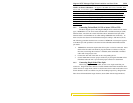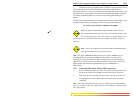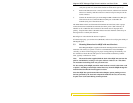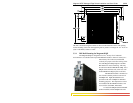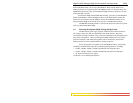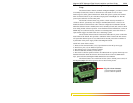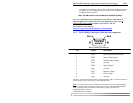
Magnum 6KQE Managed Edge Switch Installation and User Guide 02/09
17
www GarrettCom com
..
3.2 Connecting Ethernet Media
The Magnum 6KQE Switches are specifically designed to support standard
Ethernet media types within a single Switch unit. This is accomplished by using a two
popular Fiber Connectors which can be individually selected and configured.
(See Section 5.1 for a description of the Modules)
The various media types supported along with the corresponding IEEE 802.3,
802.3D, 802.3u, 802.3AB and 802.3z standards and connector types are as follows:
Media
IEEE Standard Connector
Twisted Pair (CAT 3 or 5) 10BASE-T RJ-45
Twisted Pair (CAT 5) 100BASE-TX RJ-45
Twisted pair (CAT5E or CAT6) 1000BASE-T RJ-45
Fiber (Multi-mode) 100BASE-FX MTRJ, LC
Fiber (Single-mode) 100BASE-FX LC
Fiber (Multi-mode) 1000BASE-SX LC (SFP)
Fiber (Multi-mode, Single-mode) 1000BASE-LX LC (SFP)
Fiber (Single-mode) 1000BASE-ZX LC (SFP)
See http://www.garrettcom.com/techsupport/power_budget.pdf
for Power budget
calculations, to find fiber cable distance information.
3.2.1
Connecting Twisted Pair (CAT3, CAT5, UTP or STP)
The RJ-45 ports of the Magnum 6KQE can be connected to the following two
media types: 100BASE-TX and 10BASE-T. CAT 5 cables should be used when making
100BASE-TX connections. When the ports are used as 10BASE-T ports, CAT 3 may be
used. In either case, the maximum distance for unshielded twisted pair cabling is 100
meters (328 ft).
NOTE : It is recommended that high quality CAT. 5 cable be used whenever possible
in order to provide flexibility in a mixed-speed network, since 10/100 copper
switched ports are auto-sensing for either 10 and 100Mb/s.
The following procedure describes how to connect a 10BASE-T or 100BASE-TX
twisted pair segment to the RJ-45 port. The procedure is the same for both
unshielded and shielded twisted pair cables.
1. Using standard twisted pair media, insert either end of the cable with an RJ-45
plug into the RJ-45 connector of the port. Note that, even though the connector is
shielded, either unshielded or shielded cables and wiring may be used.
2. Connect the other end of the cable to the corresponding device
3. Use the LINK LED to ensure proper connectivity by noting that the LED will be
illuminated when the unit is powered and proper connection is established.



